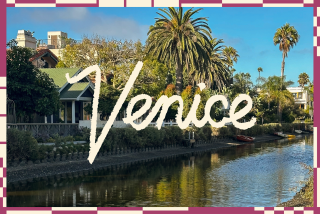Rain Can’t Dampen Cannes’ Spirit : Historic French port city is an artist’s delight, a walker’s dream and a sun-seeker’s paradise.
The Mediterranean was a frenzy of white caps that October morning, as if a mischievous child had splattered the sea with shaving cream. Palm trees rattled along the Riviera coast, and gray clouds erased the craggy backdrop of the Alps.
The rain fell fiercely in Cannes; thunder rolled from the ancient hill towns to the golden-sand beach. A lone white yacht bobbed off shore, illuminated by spears of lightning.
The lightning shimmered through the white curtains of my hotel room. I cranked open a window to smell the rain.
I suppose it takes a traveler who is weary of drought--a traveler who cannot take the sun, a traveler who, frankly, looks better in a trench coat than a swimsuit--to be as deliriously happy as I was when welcomed by showers on the Cote d’Azur.
I knew it would not last.
Cannes (population 72,000) boasts more than 300 days of sunshine each year. The artists Henri Matisse, Renoir, Picasso and Chagall, along with the writer Jean Cocteau, settled here because of the sun-drenched light, the clarity of the air, the indigo sea.
This was my first visit to Cannes, a place I knew only from its international film festival each May, an event that draws global television audiences of Olympian size. Having watched the parade of stars, I had decided that the festival reflected the town mood all year long.
My preconceptions were wrong. Cannes is no jaded nightclub-by- the-sea, one of those gaming resorts that looks far better after dark than in the fresh light of day. It is not a second-rate beach on a second-rate sea, a rumor that may have started in Hawaii or the Caribbean or Southern California; in fact, Cannes’ wide, sandy arc may be the loveliest along the Riviera, where other shores are pebbles.
Cannes remains a hospitable port and a walker’s dream, a romantic city with an artful old town--Le Suquet--on the site of a Roman outpost. Tangled streets offer bistros, small hotels, boutiques, churches and markets that sell silk and velvet hairbows, barrettes, sachets, herbs, jars of goat cheese in olive oil, strands of garlic, heaps of mussels and the abundant flowers, fruits and wines of Provence.
The wandering seems especially fine in the off-season (which began Nov. 1), when hotel prices average 25% lower than the rest of the year. Originally, winter was the prime season; European aristocracy clustered here in splendid villas. These days, the big numbers come in July and August when Cannes is packed with families on holiday. The mood is undeniably merry, but commuter traffic locks and restaurants are full and have waiting lists.
Autumn is wonderfully relaxed. Beyond the rows of plane trees in the Allees de la Liberte--a park where men brood in circles over the ballgame called pelanque --I browsed the market stalls for Provencal soaps that smell of lemon verbena, sage, olive trees, honey and magnolia. I tasted ripe peaches, figs, bitter oranges and sweet Cavaillon melons.
The sumptuous sea-front boulevard, La Croisette, proved an irresistible stroll, day or night, with its palatial, turn-of-the-century hotels--the spirited Martinez (built in 1929), the classic Carlton (1912) and the Majestic (1926). Elegant boutiques with Paris names are interspersed with cafes and bookstalls.
La Croisette is spanking clean. Each morning, the big hotels tidy their beaches, raking and smoothing the sand, collecting any paper or litter. And on those hundreds of rain-free days each year, the streets are hosed at dawn.
The constant breeze in south-facing Cannes carries the fragrances of Provence: the lavender, honeysuckle and jasmine of gardens, large and small, and the heady scent of roses, planted for their beauty and for their essential role in the perfume industry based in nearby Grasse.
Yet the beauty of Cannes is more than skin-deep. Officials have established an environmental agency to safeguard land use, air quality and water quality. Aware that some stretches of the Riviera have been overbuilt, many communities are forming watchdog groups.
A guidebook proudly cited several reforms. My favorite concerned the dumping of detergents in streams. Its English translation reminded me of the Biblical pillar-of-salt fate of Lot’s wife:
“Washerwomen, who once did their laundry in the River Paillon, have no hope for the future--and have long since been converted to washing machines.”
More to Read
Only good movies
Get the Indie Focus newsletter, Mark Olsen's weekly guide to the world of cinema.
You may occasionally receive promotional content from the Los Angeles Times.










